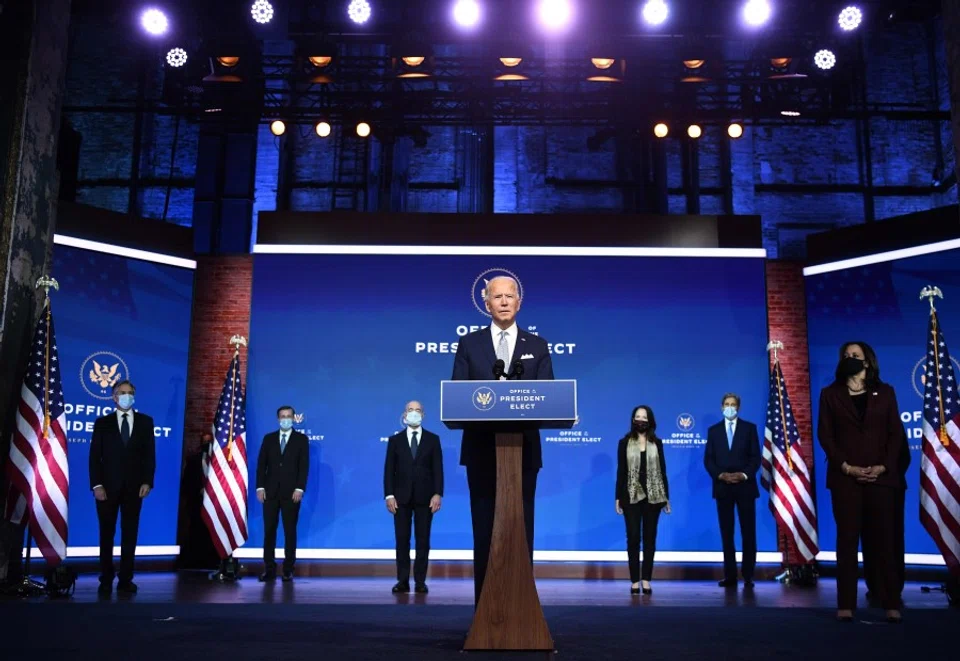Can Biden's US lead the world?
US President-elect Joe Biden has said that the US is back and ready to lead the world. Can he really turn things around? The US-China relationship, for one, is already in a serious state of distrust and acrimony. While the methods differ, says Hong Kong-based commentator Zheng Hao, the intended outcomes of the Biden administration's China policy would likely be very similar to the previous administration's. But before playing a global leading role of any kind, Biden will have to find a way to prevent his every step from being hindered by conservative Republicans in Congress.

US President-elect Joe Biden has said that the US is "back, ready to lead the world". He has also said the US will work with its allies and not against them. From Biden's announcements of his main diplomatic and national security team, it seems the post-Trump US will go on a completely different route from the past four years. The question is, can the US under Biden lead the world?
My answer is simple: it will be difficult, or very difficult.
Biden's thorough rejection of Trump's "America First" policy and his attempt to bring the US back into the international community and rebuild relations are realistic ones. The biggest mistake of Trump and advocates of Trumpism is differentiating the US from its allies and pitting the US against other major powers, thereby alienating the US from the world, resulting in its isolation while making many enemies. Now, Biden is promising to reboot relations with other powers, allies and the world, and bring the US back on track after its separation from the world.
However, this is easier said than done. Biden's challenges are complex, messy, and difficult.
Hard to turn back the clock
First, the future Biden administration will face the pandemic and political challenges within the US. Controlling the coronavirus is where Biden's domestic and foreign policies will start, and is also the key to whether his other policies can be implemented.

During the election, Biden hammered Trump's pandemic response and promised to focus on controlling the pandemic if elected. So long as the pandemic continues to run riot in the US, and the economy and people's livelihoods are not protected, foreign relations will not be normalising anytime soon. Thus, controlling the pandemic is urgent and necessary. And while Biden's ideas might be correct, it is not at all certain whether policies and measures against the pandemic can be implemented. For example, with interference by Republican states and conservative forces in Congress, all bills and acts related to the passing of law or funding will meet with Republican resistance - this is a fact that Biden will undoubtedly face.
In terms of stimulating economic recovery, another major challenge for Biden and the Democrats is whether they can push through a fifth round of stimulus measures involving over US$2 trillion. Even before the election, these measures were debated by both parties and set aside, and now it seems it will be difficult to pass in Trump's last days in office. If Biden cannot get funding, it will be like having a gun with no bullets, and nothing can get done.
From a macro perspective, in the next four years, China-US competition will focus on spheres of influence in the areas of international politics and economy, key technologies and intellectual property in driving the new economy, security and military capabilities, as well as the building of a new global relations network and system in the future.
Second, this US comeback means rebuilding relationships with powers such as China and Russia, and repairing relationships with its allies. The latter is easy, but the former is not. Biden's policy towards China is not yet fully revealed, but going by what he has said before, US policy towards China will be founded on "cooperation, competition, and containment".
Containment still the ultimate aim
I feel that China-US cooperation might be the biggest mindset change in US policy towards China in the next four years. However, this does not mean a resumption of comprehensive, pragmatic cooperation between the US and China. Areas of cooperation will revolve around the Biden administration's key domestic and external policies, such as containing the pandemic, developing the economy, handling climate change and global warming, as well as improving network security and clamping down on cross-border criminal activities. So, rather than calling it the general direction of China-US cooperation, perhaps it is more of what Biden wants.

From a macro perspective, in the next four years, China-US competition will focus on spheres of influence in the areas of international politics and economy, key technologies and intellectual property in driving the new economy, security and military capabilities, as well as the building of a new global relations network and system in the future.
... Washington's future containment of China will be done en masse. That is, the US will bring together more allies and partners to put pressure on China, rather than Trump's one-on-one strategy.
The Biden administration will not ease up on the containment of China, and will only ramp up the intensity in certain areas and projects. The Cold War may be over, but China's strong rise has sharpened the ideological tussle between both sides and made it the norm. "Trumpist" America did not bother to hide its utter detestation of the Communist Party of China (CPC), socialism with Chinese characteristics, and Chinese mainstream values.
Over the past four years, Washington's hostility towards Beijing has been unprecedented, and has not been held back by US political elites, so there is a potential risk of total conflict. Fortunately, Biden is not Trump; unfortunately, the US president is still the US president. Biden may use "dialogue, negotiation, and pressure" on China, or come up with strategies to ease US-China relations, rather than Trump's poisoning of relations with "taxes, decoupling, and smearing" - in any case, the aim of US attempts to contain China remains the same; only the methods are different.
Leading the world...against China and Russia
It has to be noted that Washington's future containment of China will be done en masse. That is, the US will bring together more allies and partners to put pressure on China, rather than Trump's one-on-one strategy. This might show Biden's ability to lead the world, because if the US is willing to lead, other countries might be willing to go along if it is in their interest, such as when it comes to territorial disputes or trade imbalance issues with China.

As for US-Russia relations, if Biden wants to lead the world, he clearly cannot avoid improving relations with Putin. Future US policies towards Russia might involve more handshakes than fists, because the US has to refocus on how to ensure Europe's security and interests are not threatened by Moscow. The US and Europe are a natural community with a shared destiny - of course, the US's wariness, concern, and long-held dislike of Russia will affect how the Biden administration improves relations with Russia. It is relatively easy for Biden to get the US to rejoin the WHO, Paris Agreement, and some UN organisations, but strengthening strategic trust again with Putin, in terms of restarting nuclear arms control talks or limiting the arms race, will prove difficult.
Finally, we have to see that all of the Biden administration's major policies, appointments and measures will be hindered by conservative Republicans in Congress. A four-year term is short, but there will be a lot of wrangling in Congress. Coupled with the fact that there is still a market for Trumpism in the White House, Congress, and Pentagon, it will be difficult for Biden to get his way.
Fortunately, Biden and Vice-President elect Kamala Harris are veterans in Congress, and are familiar with how the Senate and House of Representatives work, and are unlikely to mess up like Trump in dealings between the White House and Congress. But it also has to be noted that almost all of the newly elected Republican members of the Senate and House of Representatives are conservatives who are young, radical, and may have greater political ambitions and plans. Even for Biden who excels at resolving issues "within the system", getting everyone on board will be a tremendous challenge.
Related: Has Biden bared his fangs at China? | Biden presidency a turning point for China-US relations? | A win for Biden is a win for China? | India gets ready for shifts in US-China relations under Biden | Bumpy ride ahead for US-China relations after the US elections | A Biden presidency: Revenge of the 'Asia-Pacific' over the 'Indo-Pacific'?





![[Photos] Fact versus fiction: The portrayal of WWII anti-Japanese martyrs in Taiwan](https://cassette.sphdigital.com.sg/image/thinkchina/3494f8bd481870f7c65b881fd21a3fd733f573f23232376e39c532a2c7593cbc)